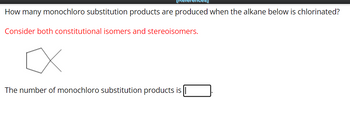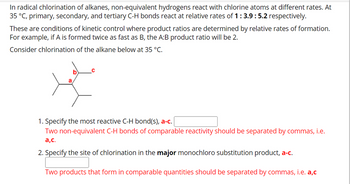
Chemistry
10th Edition
ISBN: 9781305957404
Author: Steven S. Zumdahl, Susan A. Zumdahl, Donald J. DeCoste
Publisher: Cengage Learning
expand_more
expand_more
format_list_bulleted
Question
pls help, i am stuck on this question for an assigment

Transcribed Image Text:[Reference
How many monochloro substitution products are produced when the alkane below is chlorinated?
Consider both constitutional isomers and stereoisomers.
x
The number of monochloro substitution products is

Transcribed Image Text:In radical chlorination of alkanes, non-equivalent hydrogens react with chlorine atoms at different rates. At
35 °C, primary, secondary, and tertiary C-H bonds react at relative rates of 1 : 3.9 : 5.2 respectively.
These are conditions of kinetic control where product ratios are determined by relative rates of formation.
For example, if A is formed twice as fast as B, the A:B product ratio will be 2.
Consider chlorination of the alkane below at 35 °C.
a
C
1. Specify the most reactive C-H bond(s), a-c.
Two non-equivalent C-H bonds of comparable reactivity should be separated by commas, i.e.
a,c.
2. Specify the site of chlorination in the major monochloro substitution product, a-c.
Two products that form in comparable quantities should be separated by commas, i.e. a,c
Expert Solution
This question has been solved!
Explore an expertly crafted, step-by-step solution for a thorough understanding of key concepts.
Step by stepSolved in 3 steps with 1 images

Knowledge Booster
Learn more about
Need a deep-dive on the concept behind this application? Look no further. Learn more about this topic, chemistry and related others by exploring similar questions and additional content below.Similar questions
- 1 a. b. C. d. e. f. g. CH3OH C₂H5OH H3C CH3 H3C ਸ HBr 1. NaH CH3 2. C₂H5CI Br H3C -H H- HO H CH3 H CH3 CH₂CH3 H3CH₂C H3C H 27 H Br -CH₂CH₂CH3 CH₂CH₂CH3 H3CH₂C CH3OH tº CH3ONa tº H OH H CH₂CH₂CH3 H3C NaOC₂H5 PBr3 CH3O OH SOCI₂ CH3 CH₂CH₂CH3 HBr CH3 нотн CH₂CH₂CH3 NaH DMSO CH3ONa tºarrow_forwardHow are the two BRs related and how are the OH figures relatedarrow_forwardreferring to answer C.arrow_forward
arrow_back_ios
arrow_forward_ios
Recommended textbooks for you
 ChemistryChemistryISBN:9781305957404Author:Steven S. Zumdahl, Susan A. Zumdahl, Donald J. DeCostePublisher:Cengage Learning
ChemistryChemistryISBN:9781305957404Author:Steven S. Zumdahl, Susan A. Zumdahl, Donald J. DeCostePublisher:Cengage Learning ChemistryChemistryISBN:9781259911156Author:Raymond Chang Dr., Jason Overby ProfessorPublisher:McGraw-Hill Education
ChemistryChemistryISBN:9781259911156Author:Raymond Chang Dr., Jason Overby ProfessorPublisher:McGraw-Hill Education Principles of Instrumental AnalysisChemistryISBN:9781305577213Author:Douglas A. Skoog, F. James Holler, Stanley R. CrouchPublisher:Cengage Learning
Principles of Instrumental AnalysisChemistryISBN:9781305577213Author:Douglas A. Skoog, F. James Holler, Stanley R. CrouchPublisher:Cengage Learning Organic ChemistryChemistryISBN:9780078021558Author:Janice Gorzynski Smith Dr.Publisher:McGraw-Hill Education
Organic ChemistryChemistryISBN:9780078021558Author:Janice Gorzynski Smith Dr.Publisher:McGraw-Hill Education Chemistry: Principles and ReactionsChemistryISBN:9781305079373Author:William L. Masterton, Cecile N. HurleyPublisher:Cengage Learning
Chemistry: Principles and ReactionsChemistryISBN:9781305079373Author:William L. Masterton, Cecile N. HurleyPublisher:Cengage Learning Elementary Principles of Chemical Processes, Bind...ChemistryISBN:9781118431221Author:Richard M. Felder, Ronald W. Rousseau, Lisa G. BullardPublisher:WILEY
Elementary Principles of Chemical Processes, Bind...ChemistryISBN:9781118431221Author:Richard M. Felder, Ronald W. Rousseau, Lisa G. BullardPublisher:WILEY

Chemistry
Chemistry
ISBN:9781305957404
Author:Steven S. Zumdahl, Susan A. Zumdahl, Donald J. DeCoste
Publisher:Cengage Learning

Chemistry
Chemistry
ISBN:9781259911156
Author:Raymond Chang Dr., Jason Overby Professor
Publisher:McGraw-Hill Education

Principles of Instrumental Analysis
Chemistry
ISBN:9781305577213
Author:Douglas A. Skoog, F. James Holler, Stanley R. Crouch
Publisher:Cengage Learning

Organic Chemistry
Chemistry
ISBN:9780078021558
Author:Janice Gorzynski Smith Dr.
Publisher:McGraw-Hill Education

Chemistry: Principles and Reactions
Chemistry
ISBN:9781305079373
Author:William L. Masterton, Cecile N. Hurley
Publisher:Cengage Learning

Elementary Principles of Chemical Processes, Bind...
Chemistry
ISBN:9781118431221
Author:Richard M. Felder, Ronald W. Rousseau, Lisa G. Bullard
Publisher:WILEY